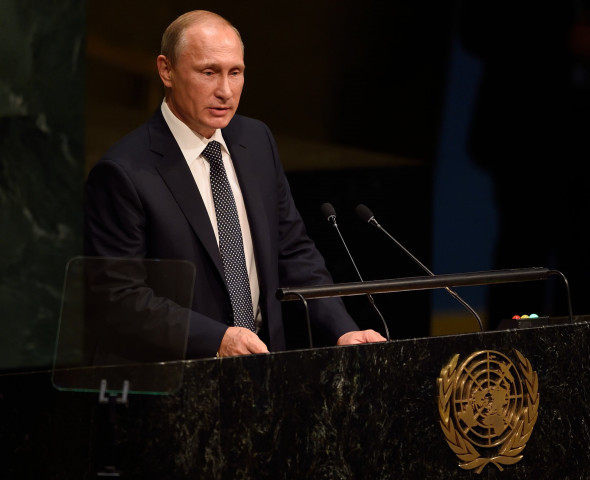Russia calls the shots
The Russians have long had a close relationship with President Assad, who they view as a strategic asset

Russia's President Vladimir Putin addresses the 70th session of the United Nations General Assembly September 28, 2015 at the United Nations in New York. AFP PHOTO
Russia’s commitment of very substantial air assets, its ground support units and the possibility of ground troops if Vladimir Putin is so minded, has within a matter of a week altered the landscape of the Syrian conflict. Russia makes none of the differentiation that the US-led coalition makes when it comes to target selection. For the Russians, as was baldly stated by Russian Foreign Minister Sergei Lavrov at a press conference on October 2, “A terrorist is a terrorist is a terrorist.” In this instance, that may include groups that are opposed to the Assad regime and have had American support and training in the recent past. President Barack Obama was equally clear that Russian failing to distinguish between IS fighters and more moderate opposition forces fighting Assad was a “recipe for disaster”.
By any standard, the Syrian war is messy, both literally and metaphorically. It is sectarian, tribal, ideological and territorial. Prior to hostilities commencing, the conflict had been latent for decades, the country held together by successive repressive regimes, latterly in the hands of the Assad family and their clans-people. The Old Colonial powers remained influential, with Britain and France busy behind the scenes. The conflict could have gone on for bloody years but for the rise and rise of the IS, which has forced assorted hands. The Russians have long had a close relationship with President Assad, who they view as a strategic asset. Syrian ports welcome the Russian Navy.
President Obama got it wrong when he said that “This is not some superpower chessboard contest” — because it is, and Russia currently enjoys the run of the game. It dictated the agenda when President Putin met with the leaders of France and Germany on October 2. The meeting was supposed to discuss the situation in Ukraine. However, Ukraine was sidelined and Syria was on the table. All sides were tightlipped when the meeting broke up.
The Russian air strikes are the first outside the boundaries of the former Soviet Union since the invasion of Afghanistan in 1979. The air strikes by the American coalition have not proved to be decisive in curbing the IS, and one must question whether the Russians are going to be able to do via airpower what others have failed to do. The potential for military misadventures with several air forces active in Syrian airspace is significant. Civilian casualties are going to rise and the propaganda machines of all sides in the conflict are already working overtime to spin their perspective on the battles on the ground and the strikes from the air. There is no talk of a peace conference that carries any credibility and the war is destined to continue unabated.
For the IS, the Russian action in the short term will make little difference. It continues to hold and administer large tracts in Syria and Iraq, and continues to attract thousands of ‘foreign fighters’ from around the world who are eager and willing to fight under its flag for whatever reason. There does not appear to be a military solution as the game is close to stalemated on the ground. Other players wait in the wings, Iran prominent among them. The war in Syria is emerging as the defining conflict of modern times, and Russia is now shaping that conflict.
Published in The Express Tribune, October 4th, 2015.
Like Opinion & Editorial on Facebook, follow @ETOpEd on Twitter to receive all updates on all our daily pieces.














COMMENTS
Comments are moderated and generally will be posted if they are on-topic and not abusive.
For more information, please see our Comments FAQ